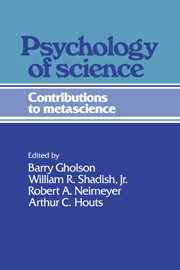Book contents
- Frontmatter
- Contents
- Preface
- Contributors
- 1 The psychology of science: An introduction
- Part I Historical issues in the psychology of science
- Part II The case for a psychology of science
- Part III Creativity and the psychology of science
- Part IV Cognition in the psychology of science
- Part V Social factors in the psychology of science
- 14 The psychology of scientific dialogues
- 15 The perception and evaluation of quality in science
- Part VI Epilogue and Prologue
- Author index
- Subject index
14 - The psychology of scientific dialogues
Published online by Cambridge University Press: 05 June 2012
- Frontmatter
- Contents
- Preface
- Contributors
- 1 The psychology of science: An introduction
- Part I Historical issues in the psychology of science
- Part II The case for a psychology of science
- Part III Creativity and the psychology of science
- Part IV Cognition in the psychology of science
- Part V Social factors in the psychology of science
- 14 The psychology of scientific dialogues
- 15 The perception and evaluation of quality in science
- Part VI Epilogue and Prologue
- Author index
- Subject index
Summary
I recently heard a splendid lecture by Stephen Jay Gould who spoke, as he has so often written, about Charles Darwin (Gould, 1986). In this lecture he punctured the myth usually absorbed from casual reading, that Darwin went off on H.M.S. Beagle and, struck with the manifest evidences of species differences, immediately began to develop a theory of evolution. On the contrary, said Gould, Darwin scarcely understood the import of his evidence until he returned to London, and began discussing his investigations with others. It was through these discussions and through his reading of Thomas Malthus's Essay on Population that the theory of evolution gradually began to grow in his mind.
Considering these outside intellectual influences on Darwin, we are led to an obvious truth: that science advances through thought processes between persons as well as thought processes within them. Our vision of intellectual discovery, strongly influenced by the Renaissance, is perhaps too centered on the individual. Battles over priority in science and technology, and institutions like the Nobel Prize, have reinforced this emphasis on the individual. Individuals are important for inventions and discoveries – in short, for progress – but so are groups, networks, and communication processes generally (Toulmin, 1972). The individual seldom thinks in isolation. Colleagues, correspondents, and critics often figure largely in shaping the direction and content of thought. In some respects, creative thought appears very much like a soccerball which is relayed back and forth among the members of a team, until one of them finally kicks a goal. We remember who kicked the goal; we often neglect the other players (Manwell & Baker, 1979).
- Type
- Chapter
- Information
- Psychology of ScienceContributions to Metascience, pp. 370 - 382Publisher: Cambridge University PressPrint publication year: 1989
- 2
- Cited by



